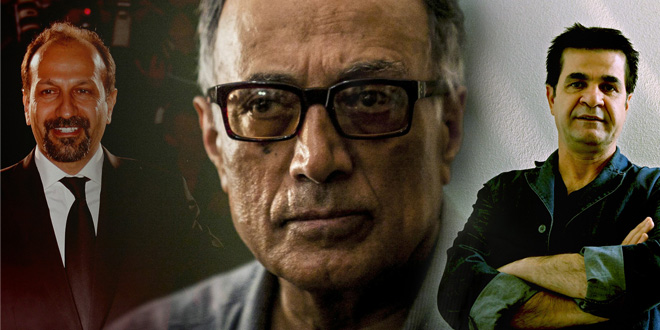
We broadcast tonight’s edition of A Window to the Fatherland with Dr. Alireza Nourizadeh reading one of his poems from the book of his collected works from the Los Angeles studios of IraneFarda TV Channel.
Dr. Alireza Nourizadeh:
We continue the program with talking to our colleague at IraneFarda TV, Parviz Kardan, who would share with us his expert views about the state of theatre and cinema in the Iran of today.
Dr. Alireza Nourizadeh:
Where did you start your career in the world of theater? Was it in Shiraz or Tehran?
Parviz Kardan:
My family left Shiraz when I was only five years old and I studied in Gholhak’s Jam high school in Tehran. Later I enrolled at the Ministry of Culture and Art to study painting as I loved it and graduated in this art.
I have a suggestion here. When an Iranian young girl or woman is harassed by the regime’s morality police on the streets and people around them wonder how to react, they should simply shout the slogan of Iran, Iran.
Anyway, let’s talk about theatre. I began my career in theatre in Tehran along with Mr. Khosravi and Mrs. Jeleh Saba in a play by Jean Paul Sartre, called The Closed Door. But this very man Sartre later had praised Khomeini by calling him the “new Gandhi”!
Dr. Alireza Nourizadeh:
I believe in comparison with leaders like Saddam and Gaddafi, the late Mohammad Reza Shah had been an innocent man. The image that had been created of him was not true.
Parviz Kardan:
It is the same with Reza Shah. Only those who travel on trains from south to north of Iran on the railways that he built nearly a century ago appreciate what he did for our country.
Going back to my career, later I began working for Iran’s national television station and was assigned to do a course in England. I did a course at the BBC and learned how to write scripts for film or television. On my return to Iran I did a script for a serial for Sabet Pasal’s TV but he said they did not produce serials and later I offered it to the National Television.
I did the first TV show in Iran in which Googoosh played and sang. Later the late Farokhzad joined me and we ran the show alternately.
Mr Pourmand and Mr Sayad also worked with me and we jointly wrote the script for the very popular Sarkar Ostovar series.
Later I became heavily involved in the production of Khane Bedoosh series.
Dr. Alireza Nourizadeh:
It is said that on the evenings that this series was being broadcast the streets of Iran were empty and even the Shah used to watch it.
Parviz Kardan:
Yes, you are right. They once asked me to produce a series about the Sepahe Danesh but I told them this was a serious subject and I would not do it.
Dr. Alireza Nourizadeh:
How did you fare in the world of cinema?
Parviz Kardan:
The pre-revolution cinema of Iran was very different from today’s and we had directors like Beyzaie, Mehrjoie and Taghvaie who were known internationally.
Dr. Alireza Nourizadeh:
You have made an interesting documentary about General Fardoust.
Parviz Kardan:
Yes. We were in this party and someone said to me why nobody makes a film about Fardoust? And now I have made it. It is called Narafigh (disloyal friend).
He was a close friend of the Shah and grew up with him from the age of 6 and reached the highest military rank in the Iranian army and at the end he betrayed the Shah.
I call upon all those who can help us with this documentary to come forward.
Dr. Alireza Nourizadeh:
Your “Come and Dine With Us” program on IraneFarda TV during the Nowruz celebrations proved very popular and it is a pleasure to have you with us.
 khalijefars News, Blogs, Art and Community
khalijefars News, Blogs, Art and Community








